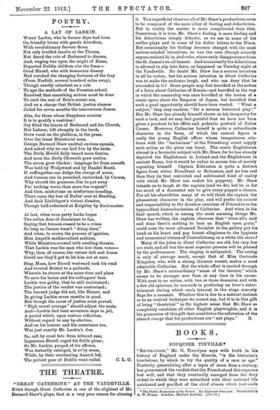THE THEATRE.
"GREAT CATHERINE" AT THE VAUDEVILLE. EVEN though Great Catherine is one of the slightest of Mr. Bernard Shaw's plays, that is a very poor reason for abusing it. To a superficial observer all of Mr. Shaw's productions seem to be composed of the same alloy of fooling and didacticism. But in reality the matter is more complicated than that. Sometimes, it is true, Mr. Shaw's fooling is mere fooling and his didacticism simply didactic, as we see in some of his earlier plays and in some of his duller letters to the Times. But occasionally his fooling becomes charged with the most serious-minded intentions, as was the case (though scarcely anyone noticed it in Androcles, whose early disappearance from the St. James's we all lament. And occasionally his didacticism is allowed to slip into farce, as happened on Tuesday night at the Vaudeville. No doubt Mr. Shaw has a serious intention in all he writes; but his serious intention in Great Catherine was to make the audience laugh, and who can deny that he succeeded in it ? Some people may feel horrified at the notion of a farce about Catherine of Russia—not horrified in the way in which the censorship was once horrified at the notion of a comic opera about the Emperor of Japan, but horrified that such a good opportunity should have been wasted. "What a subject," they may exclaim, "for a serious historical play !" But Mr. Shaw has already himself shown us his incapacity for such a task, and we may feel grateful that we have not been given a pendant to his effete and pedantic portrait of Julius Caesar. Moreover, Catherine herself is quite a subordinate character in the farce, of which the central figure is really the young English officer whose tempestuous rela- tions with the " barbarians " at the Petersburg court supply such action as the piece can boast, The comic Englishman abroad is a favourite subject with Mr. Shaw, for he has already depicted the Englishman in Ireland and the Englishman in ancient Rome, but it would be unfair to accuse him of merely repeating himself. Captain Edstaston is quite a distinct figure from either Broadbent or Britannus, and no less real than they (in that restricted and sublimated kind of reality with which Mr. Shaw can endow his puppets). Mr. Shaw intends us to laugh at the captain (and we do), but he is far too much of a dramatist not to give every puppet a chance. For all his absurdities many of us will think the captain the pleasantest character in the play, and will prefer his naivete and respectability to the drunken cynicism of Potemkin or the hypocritical humanitarianism of Catherine. And when in his final speech, which is among the most amusing things Mr. Shaw has written, the captain observes that "when all's said and done there's nothing to beat an English open grate," could even the most advanced Socialist in the gallery put his hand on his heart and pay honest allegiance to the hygienic and economical virtues of Centralhitsung or a white tile stove ?
Many of the jokes in Great Catherine are old, but very few are stale, and all but the most superior persons will be pleased by the performance. The staging is antiquated. The acting is only of average merit, except that of Miss Gertrude Kingston, who, with a strong German accent, makes a most admirable Catherine. But the whole affair is carried through by Mr. Shaw's extraordinary "sense of the theatre," which seems to be stronger now than at any time in his career. With next to no action, with two or three dummies, and with a few old opinions, be succeeds in producing an hour's enter- tainment during which one's interest in the stage scarcely flags for a moment. Whether this is due to a natural instinct or to an evolved technique we cannot say, but it is in this gift of being " theatrical " in the highest sense that Mr. Shaw so completely outshines all other English playwrights, and it is his possession of this gift that constitutes the refutation of the absurd charge that his productions are "not plays." B.


















































 Previous page
Previous page